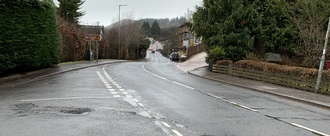-
Kings Norton skatepark extension & repairsKings norton skatepark has played a big part in giving skateboarders, bmxers and scooterists a purpose built and safe environment to use for the last 15+ years. The existing park has fallen into disrepair and needs some attention. An extension of the park would benefit the local community, gives young people a place to go and an opportunity to try something new.1,197 of 2,000 SignaturesCreated by Dan Hayward
-
Request for major traffic calming measures to be installed in CrossfordWe are seeing an increase in both cars and vans speeding through the village and past our primary school putting themselves, other motorists, pedestrians and local families at risk of serious injury or death. If you are concerned about this growing problem, please sign our petition calling for action to be taken to prevent future accidents and deaths.376 of 400 SignaturesCreated by Andy Carnegie
-
CAPTAIN SIR TOM MOORE HOSPITALAt the age of 99 Sir Tom. Decided to selflessly raise some much needed funds for our NHS at a time our country was on its knees due to Covid 19.... He managed to raise a phenomenal amount of £33 million.... Today our hero laid down his sword I cannot think of a more fitting honour and legacy1,841 of 2,000 SignaturesCreated by Samantha Haworth
-
Premier League referees to publicly explain their decisions post-match"Best league in the world, and probably the worst officials" - Neil Warnock Only two leagues in the world have professionally employed referees; Italy and England. But since the retirement of Howard Webb and Mark Clattenburg, not a single English referee has been considered competent enough to manage a major football game outside of England. At the 2018 world cup, England – the original lawmaking nation of the sport – was not selected to submit a team of officials, over countries like Bahrain, Bolivia and Gambia. English referees have become the laughing stock of FIFA and UEFA, by their own hand. The Premier League is a multi-billion pound enterprise, where fortunes are made and lost on the competency of referees. In any other industry, failure to adequately do one's job is met with justified punishment, but these so-called "elite" referees are protected at all costs by their employers. PGMOL, the FA, and the Premier League have failed time and time again to address the slow and sustained demise of British refereeing, consistently defending errors. For far too long, referees of the English Premier League have ruled with almost complete impunity when officiating football matches. Poor decisions have consistently decided the outcome of matches. If referees never have to take responsibility for their actions, the quality of their judgement will never improve. We are simply campaigning for referees to release a full explanation for their important decisions after officiating a game. This can be achieved with a simple interview orchestrated by a neutral party, or by making their match report public. This is not a witch-hunt. This is about improving thetransparency and the integrity of the game.220 of 300 SignaturesCreated by Zac Hallgarten
-
Sir captain tom moore Acknowledgement from UK govThis is very important to the people and the NHS138 of 200 SignaturesCreated by Samuel mcnally
-
Stop Chelmsford City Council charging for car parking at Hylands ParkWhilst numbers were submitted to CCC on the 12th February. On a recent BBC radio interview a council representative confirms they intend to push ahead anyway - we dont want that to happen. Ongoing signatures and comments are therefore welcomed as they still contribute to the overall support for this campaign. Please do read the detail below, sign and share. I would also encourage you to email your local Chelmsford City Councillor requesting they represent any concerns you have at the full council meeting on the 24th February. Please be consice and kind in your communicatins to them. You can find the contact details for your local councillor here: https://www.chelmsford.gov.uk/your-council/councillors-committees-and-decision-making/councillors/find-a-councillor/ Chelmsford City Council (then Borough) purchased Hylands in 1964 and since then residents and visitors alike have been able to visit and enjoy the Hylands estate without need to pay for parking. This petition calls for local councillors to get behind the residents they represent and speak against the proposal to charge for parking at Hylands Park. At the Cabinet Meeting, on the 26th January 2021, Councillors presented the Chelmsford City Council Revenue Budget for 2021/22. Within this was the proposal to implement a parking charge at Hylands Park. Whilst it is accepted that the City Council is facing a financial shortfall, residents are opposed to this as a mechanism to increase revenue. There are many reasons why this proposal to charge for parking at Hylands Park should be abandoned, some of which are listed below: • Green spaces are promoted as important for maintaining positive mental health, in the midst of the pandemic and through the recovery to come this is even more important. • Charging for car parking would put a premium on accessing green open spaces and make it more difficult for all to visit. • Setup and maintenance of payment infrastructure is not without cost. This, coupled with a possible scheme to vary the charge for local residents as opposed to visitors to Chelmsford only adds further complication will greatly erode any benefit from charging. • Visitors may seek out alternative ‘free’ parking in residential areas local to Hylands such as Writtle – increasing congestion and necessitating further parking restrictions. • Charging for parking could decrease visitor numbers and thereby reduce footfall to businesses within the site. Everyone is welcome to sign this petition, all signatures and comments are greatfully received however, when submitted to Chelmsford City Council, only signatures of people who live, work or study within the Chelmsford City Council authority boundary will be counted for the puspose of petitioning the council. You can check here if you live within the authority boundary: www.gov.uk/find-local-council7,628 of 8,000 SignaturesCreated by Robert Gisby
-
Petition Supporting Proposals to Improve the Car Park at Sutton Park's Boldmere Gate (2021/00528/PA)Boldmere Gate is one of the major entrances to Sutton Park and the current parking provision is both unsafe and unattractive. The plans that have been submitted propose laying eco-turf and porous hard standing that will make the parking area more attractive visually, safer for visitors, better for the disabled whilst being ecologically sustainable and sensitive to Sutton Park's status as a Grade II listed Historic Park & Garden, Scheduled Ancient Monument, Site of Special Scientific Interest, National Nature Reserve and the Heart and Lungs of our Town. The current damaged overspill area would be returned to natural heathland. The 2022 Commonwealth Games Triathlon will take place around Boldmere Gate, the current facilities are not fit for purpose and do not do justice to Sutton Coldfield. This is a perfect opportunity to showcase Sutton Coldfield internationally whilst leaving a tangible legacy for the residents. More details of the plans can be found here: http://eplanning.idox.birmingham.gov.uk/publisher/docs/13FC24C7A7169B908205CDFD06FBE2FC/Document-13FC24C7A7169B908205CDFD06FBE2FC.PDF500 of 600 SignaturesCreated by Manish Puri
-
Youth Centre for PenzanceLocally and nationally, young people's mental health is in crisis, made worse by the ongoing coronavirus crisis. But, the provision of a safe space for young people in Penzance could be the chance to support, guide and provide opportunities to those in need. The local councils needs to listen and respond to the needs of young people by providing a youth strategy and youth centre space for the people of Penzance1,459 of 2,000 SignaturesCreated by Jodie Tellam
-
British Airways To Resume Its Direct Flights To Dhaka-London 10 Years Of LobbyingI believe it will be a next level of 21st century British Airways, business. innervation and viable, profit margin, for the airline and the brand. it is a huge demand that in the very new future to operate flights direct to Sylhet via Dhaka of long term business plan, that British Airways needs to take on board of account and consider the great potentials'.71 of 100 SignaturesCreated by Salim Azam Chy
-
FASD. Em’s law. Mandatory Foetal Alcohol Spectrum Disorder training for all professionalsEms law was started by Ems mother, Ali Mccormick, after her child had been so systemically abused, misunderstood and failed by social care children’s services, camhs, previous education, police, courts and respite carer, that she collapsed from extreme trauma after unlawfully being put on child protection by a social worker not even qualified to do so. She eventually became so mentally unwell from being failed that she tried to take her own life and ended up in a mh unit who unlawfully restrained, failed to provide her assessed needs, injected and abused her and denied her humans rights to even see her family. There is not one provision in the uk for fasd and mh residentially. Over 7000 babies are born every year in uk alone and the worlds most common learning disability in the world, which can, and does, cause devastation to the person and their families/ carers Parents are ignored and often tragically blamed for the behaviour of their disabled child People are being incarcerated in mental health hospitals, prisons or punitive correction centres due to a lack of awareness of fasd and support. This is a world pandemic of injustice, unnecessary pain and monstrous disaster. People with fasd can achieve and do well in life. The correct provisions and scaffolding put in place can change lives. This tragedy needs urgent attention. Please sign and share everywhere, and make Em’s law of raising awareness of FASD mandatory, as well as knowledgeable support services.2,419 of 3,000 SignaturesCreated by Alison mccormick
-
Brighton & Hove Taxi/Private Hire Trade - COVID-19 Council Financial Support GrantThe Brighton & Hove taxi/private hire trade has suffered considerably during the COVID-19 pandemic and is calling for the council to act now and provide similar financial help to the trade that other licensing areas have provided as shown (to date) with the list still growing: Bury "Bury cabbies are next to receive a support package to help with overhead costs. Bury North Labour announced: "Extra support for Bury's taxi drivers. "Bury's Labour cabinet has approved a new package of support to include Bury's taxi drivers, meaning you're now eligible to apply for up to £677 per month in grant support." Barnsley £500 Barrow in Furness £210 Basildon £1,500 Bournemouth Christchurch & Poole £2,500 Braintree £,1334 Bristol £1,000 Bunley £500 Carlisle £1,634 Chester / Cheshire West £500 Chelmsford £400 Dacorum £750 Derby £250 Doncaster £500 Erewash £1000 Halton £100 Hull £1000 Knowsley £100 Liverpool £210 Mid-Sussex - £400 Luton £500 Mansfield £500 North Lincolnshire £653 Northumberland £500 if not claimed SEISS or £200 if you have (2nd grant) Northhampton £500/£1000 Nottingham £400 Pendale £750 Plymouth £953 Rochdale £500 Rotherham £500 Rushcliffe £500 Sefton £100 Sheffield £500 South Tyneside £250 St Helens £100 Stevenage £500 Stockton on Tees £200 Warrington £210 West Somerset £350 Wirral £100 Wyre Forest £250 York £500 PLUS subject to meeting criteria: ALL drivers in Wales - £4,000 (£2,000 x two grants) ALL drivers in Northern Ireland - £1,500 ALL drivers in Scotland - £1,500 In 2020 when the council were given funding from the government to assist local businesses the local cab trade sought financial help to install vehicle partition screens at an average cost of £300 per installation. The trade were told by the council that money provided by government did not cover any provision for such a grant and wrote to the government seeking permission to use funding that was left over to provide financial assistance for the screens. We were told that there was no response. Over the last few months a considerable amount of Licensing Authorities have provided various amounts of funding to their respective local cab drivers/proprietors without any issues as shown and Brighton & Hove taxi/private hire trade is seeking support to petition council to do the same here. In signing this petition you will be supporting the 1200+ individual locally licensed Brighton & Hove licensed taxi/private hire drivers/proprietors. Thank you Andrew Peters On behalf of the Brighton & Hove Taxi Trade Forum742 of 800 SignaturesCreated by Andrew Peters
-
Stop Ponders End Barclays Closing on May 2021We the undersigned, traders and residents of Ponders End, Enfield urge Barclays Bank to reconsider their decision to close the Ponders End branch this coming May 2021. We expect Barclays to consider the impact the closure will have on our town leaving it without a bank and their social responsibility towards the community, individuals and businesses who would find it incredibly difficult to conduct their affairs via a post office, on line or by travelling to other branches of Barclays where parking is also a nightmare.291 of 300 SignaturesCreated by Fokrul Meah
Hello! We use cookies to improve your experience by providing insights into how the site is being used. Find out more.












